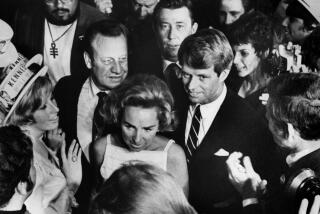The Political Wife--an Enduring Breed : Women: As Mrs. Nixon is eulogized, other long-suffering spouses await liberation from the public’s expectations.
- Share via
The obituaries of Pat Nixon have sparked not a rush to judgment but a race for justification. Writers have trotted out adjectives seldom seen outside profiles of political wives, such as “devotedly loyal” and “consistently supportive,” to try to give meaning to her long public life.
The high marks for the former First Lady come from a rather idiosyncratic rating system, one usually applied to continuing characters on daytime soaps: She was deemed good and successful in direct correlation to the wrongdoing and failure of her husband. Isn’t she great, America marveled, to put up with all that and still smile.
Richard Nixon will be revisited and revised by history. Pat Nixon will be measured by the more mercurial yardstick of public opinion. An objective judgment of her performance as First Wife will be impossible as long as society keeps rewriting the part, changing the character.
And what do we know of any political wife? We know the politician, and he knows he has some chance of victory. His wife has no such hope. There’s no win-win situation if you’re a political wife. It is the ultimate damned if you do, damned if you don’t--and damned if he does or doesn’t.
Our collective vision of a “good political wife” is as sketchy and changeable as our concept of a swell Sunday supper. We’ve tossed out ga-ga loyalty, like that of Pat Nixon and Nancy Reagan, right along with the pot roast and gravy. But when Hillary Clinton tries a more modern fare, serving up speeches on real issues, she gets burned and has to scurry to the kitchen to whip up some Damage-Control Cookies. From scratch. Perhaps no matter what a political wife serves up just never quite hits the spot of a finicky public appetite for, umm, whatever it is we’re craving.
What is it that we want in the wives of our elected officials? It’s just as tough a question and as vague an answer if the spouse is running for selectman or senator. Look good, but not too good, or people will wonder how you can afford all those great clothes. Be thin, but not too thin--maybe you’ve got an eating disorder. Be warm with your husband in public, but not too clingy, or there will be rumors of marital troubles. Be independent, but not a free-thinker, or there will be expectations of marital troubles.
Keep the kids nearby, but not in the way, or you’ll look exploitative. Bring in an outside income, but not too much, or you’ll look greedy. Be up on the issues, but not too outspoken, since you’re only the wife anyway, and what are you supposed to know.
Campaigning is tough. Have smiles for supporters and snacks for reporters and don’t dare get caught with a bourbon and soda in your hand. Spend weeks being told where to go and what to say and who to talk to, all by staff hired by someone else, all praying that you won’t slip up and cost them the election.
First Ladies set the standard for political wifehood, and two who broke the rules turned out to be perhaps the most effective White House women so far.
Eleanor Roosevelt gets her historic due as a great First Lady. But she will never be known as a great political wife. She was not a snappy dresser. She was opinionated and controversial, and she spoke in a tone of voice that people found unpleasant. She nagged her husband about civil rights, confronted him when he strayed from his convictions. Or from hers. God knows how she would have fared in the era of talk shows.
The woman with the shortest time on the job perhaps redesigned it most. Betty Ford was, and is, the bridge to the modern First Lady. Elegant and candid, she allowed her personal crises of breast cancer and, later, alcoholism to be made public as examples to encourage other women. Without hesitation, she gave high-profile, vocal support to the equal rights amendment. Now, 16 years after leaving the White House, she’s still gutsy, recently asking publicly what indeed do all these leaders fear about openly gay people serving in the military.
In the past century, American women have done an effective job of liberating themselves. Now it’s time to get real and, to borrow a phrase from the 1960s, “Free All Political Wives.”
Of course, a quicker route to liberating political spouses is simply to elect more women. When the candidate’s spouse is a man, no one expects homemade cookies.
More to Read
The complete guide to home viewing
Get Screen Gab for everything about the TV shows and streaming movies everyone’s talking about.
You may occasionally receive promotional content from the Los Angeles Times.






